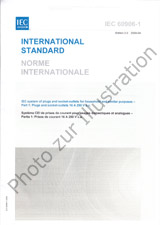Wir benötigen Ihre Einwilligung zur Verwendung der einzelnen Daten, damit Sie unter anderem Informationen zu Ihren Interessen einsehen können. Klicken Sie auf "OK", um Ihre Zustimmung zu erteilen.

IEC 62351-9-ed.2.0
Power systems management and associated information exchange - Data and communications security - Part 9: Cyber security key management for power system equipment
Name übersetzen
NORM herausgegeben am 6.6.2023
Informationen über die Norm:
Bezeichnung normen: IEC 62351-9-ed.2.0
Ausgabedatum normen: 6.6.2023
SKU: NS-1145052
Zahl der Seiten: 296
Gewicht ca.: 919 g (2.03 Pfund)
Land: Internationale technische Norm
Kategorie: Technische Normen IEC
Kategorie - ähnliche Normen:
Die Annotation des Normtextes IEC 62351-9-ed.2.0 :
IEC 62351-9:2023 specifies cryptographic key management, primarily focused on the management of long-term keys, which are most often asymmetric key pairs, such as public-key certificates and corresponding private keys. As certificates build the base this document builds a foundation for many IEC 62351 services (see also Annex A). Symmetric key management is also considered but only with respect to session keys for group-based communication as applied in IEC 62351-6. The objective of this document is to define requirements and technologies to achieve interoperability of key management by specifying or limiting key management options to be used. This document assumes that an organization (or group of organizations) has defined a security policy to select the type of keys and cryptographic algorithms that will be utilized, which may have to align with other standards or regulatory requirements. This document therefore specifies only the management techniques for these selected key and cryptography infrastructures. This document assumes that the reader has a basic understanding of cryptography and key management principles. The requirements for the management of pairwise symmetric (session) keys in the context of communication protocols is specified in the parts of IEC 62351 utilizing or specifying pairwise communication such as: • IEC 62351-3 for TLS by profiling the TLS options • IEC 62351-4 for the application layer end-to-end security • IEC TS 62351-5 for the application layer security mechanism for IEC 60870-5-101/104 and IEEE 1815 (DNP3) The requirements for the management of symmetric group keys in the context of power system communication protocols is specified in IEC 62351-6 for utilizing group security to protect GOOSE and SV communication. IEC 62351-9 utilizes GDOI as already IETF specified group-based key management protocol to manage the group security parameter and enhances this protocol to carry the security parameter for GOOSE, SV, and PTP. This document also defines security events for specific conditions which could identify issues which might require error handling. However, the actions of the organisation in response to these error conditions are beyond the scope of this document and are expected to be defined by the organizations security policy. In the future, as public-key cryptography becomes endangered by the evolution of quantum computers, this document will also consider post-quantum cryptography to a certain extent. Note that at this time being no specific measures are provided. This second edition cancels and replaces the first edition published in 2017. This edition constitutes a technical revision. This edition includes the following significant technical changes with respect to the previous edition: a) Certificate components and verification of the certificate components have been added; b) GDOI has been updated to include findings from interop tests; c) GDOI operation considerations have been added; d) GDOI support for PTP (IEEE 1588) support has been added as specified by IEC/IEEE 61850-9-3 Power Profile; e) Cyber security event logging has been added as well as the mapping to IEC 62351-14; f) Annex B with background on utilized cryptographic algorithms and mechanisms has been added. IEC 62351-9:2023 specifie la gestion des cles cryptographiques, principalement axee sur la gestion des cles a long terme, qui sont le plus souvent des paires de cles asymetriques, telles que des certificats de cles publiques et les cles privees correspondantes. Comme les certificats constituent la base, le present document etablit une fondation pour de nombreux services de l’IEC 62351 (voir egalement Annex A). La gestion des cles symetriques est egalement prise en compte, mais uniquement en ce qui concerne les cles de session pour les communications de groupe, telles qu’elles sont appliquees dans l’IEC 62351-6. L’objectif du present document est de definir les exigences et les technologies permettant d’assurer l’interoperabilite de la gestion des cles en specifiant ou en limitant les options de gestion de cles a utiliser. Le present document presume qu’une organisation (ou un groupe d’organisations) a defini une politique de securite pour selectionner le type de cles et d’algorithmes cryptographiques qui seront utilises, qui peuvent etre a aligner sur d’autres normes ou exigences reglementaires. Le present document specifie donc uniquement les techniques de gestion de ces infrastructures de cle et de cryptographie selectionnees. Le present document presume que le lecteur a des notions de base en cryptographie et sur les principes de gestion des cles. Les exigences relatives a la gestion des paires de cles (de session) symetriques dans le contexte des protocoles de communication sont specifiees dans les parties de l’IEC 62351 qui utilisent ou specifient une communication par paire, telles que: • l’IEC 62351-3 pour TLS en profilant les options TLS; • l’IEC 62351-4 pour la securite de bout en bout de la couche application; • l’IEC 62351-5 pour le mecanisme de securite de la couche application pour l’IEC 60870-5-101/104 et l’IEEE 1815 (DNP3). Les exigences relatives a la gestion des cles de groupe symetriques dans le contexte des protocoles de communication des systemes de puissance sont specifiees dans l’IEC 62351-6 pour l’utilisation de securite de groupe pour proteger les communications GOOSE et SV. L’IEC 62351-9 utilise GDOI comme protocole de gestion de cles par groupe deja specifie par l’IETF (Internet Engineering Task Force) pour gerer le parametre de securite de groupe et ameliore ce protocole pour transporter le parametre de securite pour les communications GOOSE, SV et PTP. Le present document definit egalement les evenements de securite pour des conditions specifiques susceptibles d’identifier des problemes pouvant exiger un traitement des erreurs. Cependant, les actions de l’organisation en reponse a ces conditions d’erreur ne relevent pas du domaine d’application du pre
Empfehlungen:
EEviZak – alle Gesetze einschließlich ihrer Evidenz in einer Stelle
Bereitstellung von aktuellen Informationen über legislative Vorschriften in der Sammlung der Gesetze bis zum Jahr 1945.
Aktualisierung 2x pro Monat!
Brauchen Sie mehr Informationen? Sehen Sie sich diese Seite an.



 Cookies
Cookies
